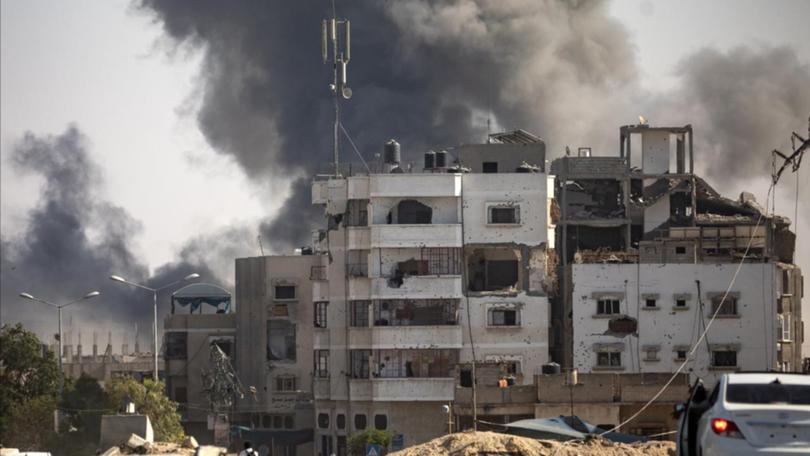An Israeli strike on a Gaza humanitarian zone tent camp kills at least 40 people, Palestinians say
Israel said the air strike on the tent camps along the Gaza coast was targeting ‘significant’ Hamas militants.

An Israeli strike on a crowded tent camp housing Palestinians displaced by the war in Gaza killed at least 40 people and wounded 60 others early Tuesday, Palestinian officials said. Israel said it targeted “significant” Hamas militants, allegations denied by the militant group.
It was among the deadliest strikes yet in Muwasi, a sprawl of crowded tent camps along the Gaza coast that Israel designated as a humanitarian zone for hundreds of thousands of civilians to seek shelter from the Israel-Hamas war.
The Civil Defense, first responders operating under the Hamas-run government, said it recovered 40 bodies from the strike and was still looking for people. It said entire families were killed in their tents.
Sign up to The Nightly's newsletters.
Get the first look at the digital newspaper, curated daily stories and breaking headlines delivered to your inbox.
By continuing you agree to our Terms and Privacy Policy.An Associated Press camera operator saw three large craters at the scene, where first responders and displaced people were sifting through the sand and rubble with garden tools and their bare hands by the light of mobile phones. They pulled body parts from the sand, including what appeared to be a human leg.
Attaf al-Shaar, who was displaced from the southern city of Rafah, said the strike happened just after midnight and caused a fire.
“The people were buried in the sand. They were retrieved as body parts,” she told a reporter at the scene.
Nasser Hospital in Khan Younis, one of three hospitals to receive casualties, said around two dozen bodies were brought in from the strike.
The Israeli military said it had struck Hamas militants who were operating in a command-and-control centre. It said its forces used precise munitions, aerial surveillance and other means to avoid civilian casualties.
Israel says it tries to avoid harming civilians throughout the war, which was ignited by Hamas’ October 7 attack. It blames Hamas for their deaths because the militants often operate in residential areas and are known to position tunnels, rocket launchers and other infrastructure near homes, schools and mosques.
Hamas released a statement denying any militants were in the area. Neither Israel nor Hamas provided evidence to substantiate their claims.
The war has caused vast destruction and displaced around 90 per cent of Gaza’s population of 2.3 million, often multiple times. Israeli evacuation orders, which now cover around 90 per cent of the territory, have pushed hundreds of thousands of people into Muwasi, a sprawling line of squalid tent camps along the coast.
Aid groups have struggled to provide even basic services in Muwasi, and Israel has occasionally struck targets there despite designating it as a humanitarian zone.
Gaza’s Health Ministry says over 40,000 Palestinians have been killed in Gaza since the war began. It does not differentiate between fighters and civilians in its count.
Hamas-led militants killed some 1,200 people, mostly civilians, in their October 7 attack. They abducted another 250 people and are still holding around 100 after releasing most of the rest in exchange for Palestinians imprisoned by Israel during a weeklong cease-fire last November. Around a third of the remaining hostages are believed to be dead.
The United States, Egypt and Qatar have spent much of this year trying to broker an agreement for a cease-fire and the release of the hostages, but the talks have repeatedly bogged down as Israel and Hamas have accused each other of making new and unacceptable demands.
The war has plunged Gaza into a humanitarian crisis, and humanitarian groups have struggled to provide aid because of ongoing fighting, Israeli restrictions, and the breakdown of law and order. The international authority on the severity of hunger crises said in June that the territory is at high risk of famine.
The main United Nations agency providing aid to Palestinians said Israeli troops stopped a convoy taking part in a polio vaccination campaign for more than eight hours on Monday, despite it coordinating with the military. UNRWA head Philippe Lazzarini said the staffers who were held had been taking part in the campaign in northern Gaza and Gaza City.
“The convoy was stopped at gun point just after the Wadi Gaza checkpoint with threats to detain UN staff,” he wrote on the social platform X. “Heavy damage was caused by bulldozers to the UN armoured vehicles.”
He said the staff and the convoy later returned to a UN base, but it was unclear if a polio vaccination campaign would take place Tuesday in northern Gaza.
The Israeli military did not immediately respond to a request for comment.
The vaccination drive, launched after doctors discovered the first polio case in the Palestinian enclave in 25 years, aims to vaccinate 640,000 children during a war that has destroyed the health care system.
